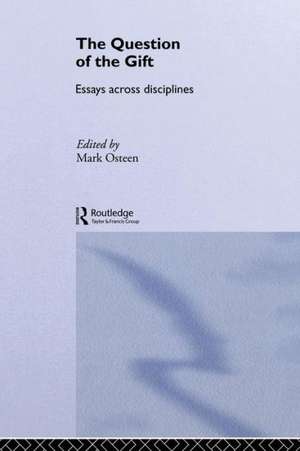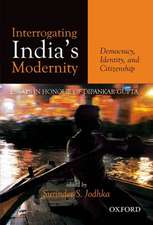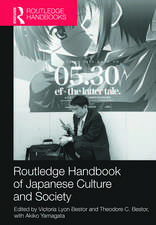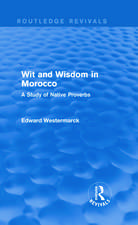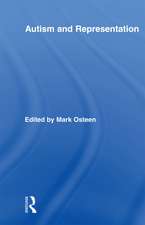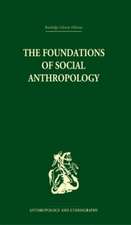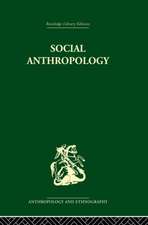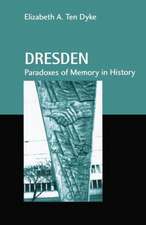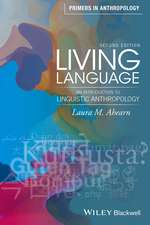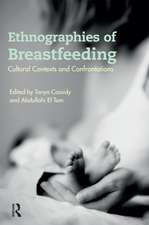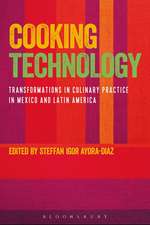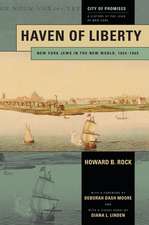The Question of the Gift: Essays Across Disciplines: Routledge Studies in Anthropology
Editat de Mark Osteenen Limba Engleză Paperback – 7 feb 2014
| Toate formatele și edițiile | Preț | Express |
|---|---|---|
| Paperback (1) | 493.12 lei 6-8 săpt. | |
| Taylor & Francis – 7 feb 2014 | 493.12 lei 6-8 săpt. | |
| Hardback (1) | 1006.60 lei 6-8 săpt. | |
| Taylor & Francis – 8 aug 2002 | 1006.60 lei 6-8 săpt. |
Din seria Routledge Studies in Anthropology
-
 Preț: 310.14 lei
Preț: 310.14 lei -
 Preț: 310.65 lei
Preț: 310.65 lei -
 Preț: 311.76 lei
Preț: 311.76 lei -
 Preț: 341.62 lei
Preț: 341.62 lei -
 Preț: 295.43 lei
Preț: 295.43 lei -
 Preț: 343.80 lei
Preț: 343.80 lei -
 Preț: 217.08 lei
Preț: 217.08 lei -
 Preț: 363.03 lei
Preț: 363.03 lei - 18%
 Preț: 1052.35 lei
Preț: 1052.35 lei -
 Preț: 369.73 lei
Preț: 369.73 lei - 18%
 Preț: 999.46 lei
Preț: 999.46 lei -
 Preț: 369.18 lei
Preț: 369.18 lei - 18%
 Preț: 1061.06 lei
Preț: 1061.06 lei -
 Preț: 429.41 lei
Preț: 429.41 lei -
 Preț: 414.53 lei
Preț: 414.53 lei - 18%
 Preț: 1113.12 lei
Preț: 1113.12 lei - 30%
 Preț: 875.56 lei
Preț: 875.56 lei -
 Preț: 432.87 lei
Preț: 432.87 lei - 18%
 Preț: 1080.71 lei
Preț: 1080.71 lei - 26%
 Preț: 763.78 lei
Preț: 763.78 lei - 18%
 Preț: 997.90 lei
Preț: 997.90 lei -
 Preț: 434.84 lei
Preț: 434.84 lei - 26%
 Preț: 818.10 lei
Preț: 818.10 lei - 18%
 Preț: 1109.21 lei
Preț: 1109.21 lei - 18%
 Preț: 1057.09 lei
Preț: 1057.09 lei -
 Preț: 483.55 lei
Preț: 483.55 lei - 26%
 Preț: 821.10 lei
Preț: 821.10 lei -
 Preț: 370.71 lei
Preț: 370.71 lei - 18%
 Preț: 1058.79 lei
Preț: 1058.79 lei - 18%
 Preț: 1109.99 lei
Preț: 1109.99 lei - 26%
 Preț: 848.96 lei
Preț: 848.96 lei - 18%
 Preț: 1054.71 lei
Preț: 1054.71 lei -
 Preț: 486.42 lei
Preț: 486.42 lei - 26%
 Preț: 819.09 lei
Preț: 819.09 lei - 31%
 Preț: 763.00 lei
Preț: 763.00 lei - 18%
 Preț: 1105.24 lei
Preț: 1105.24 lei - 26%
 Preț: 764.20 lei
Preț: 764.20 lei - 18%
 Preț: 1005.04 lei
Preț: 1005.04 lei - 26%
 Preț: 766.24 lei
Preț: 766.24 lei - 18%
 Preț: 1111.55 lei
Preț: 1111.55 lei - 18%
 Preț: 1057.43 lei
Preț: 1057.43 lei - 18%
 Preț: 1055.51 lei
Preț: 1055.51 lei
Preț: 493.12 lei
Nou
Puncte Express: 740
Preț estimativ în valută:
94.36€ • 98.78$ • 78.08£
94.36€ • 98.78$ • 78.08£
Carte tipărită la comandă
Livrare economică 05-19 aprilie
Preluare comenzi: 021 569.72.76
Specificații
ISBN-13: 9780415869140
ISBN-10: 0415869145
Pagini: 320
Ilustrații: black & white illustrations
Dimensiuni: 156 x 234 x 17 mm
Greutate: 0.54 kg
Ediția:1
Editura: Taylor & Francis
Colecția Routledge
Seria Routledge Studies in Anthropology
Locul publicării:Oxford, United Kingdom
ISBN-10: 0415869145
Pagini: 320
Ilustrații: black & white illustrations
Dimensiuni: 156 x 234 x 17 mm
Greutate: 0.54 kg
Ediția:1
Editura: Taylor & Francis
Colecția Routledge
Seria Routledge Studies in Anthropology
Locul publicării:Oxford, United Kingdom
Public țintă
Postgraduate and ProfessionalCuprins
Introduction: Questions of the Gift Mark Osteen Part I: Redefining Reciprocity 1. A Free Gift Makes No Friends James Laidlaw 2. Unbalanced Reciprocity: Asymmetrical Gift-Giving and Social Hierarchy in Rural China Yunxiang Yan 3. Unpacking the Gift: Illiquid Goods and Empathetic Dialogue Lee Anne Fennell Part II: Kinship, Generosity and Gratitude: Ethical Foundations 4. The Patriarchal Narratives of Genesis and the Ethos of Gift Exchange Charles H. Hinnant 5. The Ethics of Generosity and Friendship: Aristotle's Gift to Nietzsche? Martha Kendral Woodruff 6. Adam Smith and the Debt of Gratitude Eun Kyung Min Part III: The Gift and Artistic Commerce 7. Catullus and the Gift of Sentiment in Republican Rome Jacqui Sadashige 8. Gabriele D'Annunzio: The Art of Squandering Nicoletta Pireddu 9. Conrad's Guilt-Edged Securities: 'Karain: A Memory' via Simmel and Benjamin Anthony P. Fothergill 10. Formed by Homages: H. D., Robert Duncan, and the Spirit of the Gift Stephen Collis Part IV: Posing New Questions 11. Gift or Commodity? Mark Osteen 12. The Ghost of the Gift: The Unlikelihood of Economics Antonio Callari 13. Give the Ghost a Chance! A Comrade's Shadowy Addendum Jack Amariglio 14. The Pleasures and Pains of the Gift Andrew Cowell
Notă biografică
Mark Osteen is Professor of English and Director of Film Studies at Loyola College, Baltimore. He is the author of American Magic and Dread: Don DeLillo's Dialogue with Culture (2000), and The Economy of Ulysses: Making Both Ends Meet (1995), the editor of the Viking Critical Edition of Don DeLillo's White Noise, and co-editor, with Martha Woodmansee, of The New Economic Criticism (Routledge, 1999).
Descriere
The Question of the Gift is the first collection of new interdisciplinary essays on the gift. Bringing together scholars from a variety of fields, including anthropology, literary criticism, economics, philosophy and classics, it provides new paradigms and poses new questions concerning the theory and practice of gift exchange. In addressing these questions, contributors not only challenge the conventions of their fields, but also combine ideas and methods from both the social sciences and humanities to forge innovative ways of confronting this universal phenomenon.
